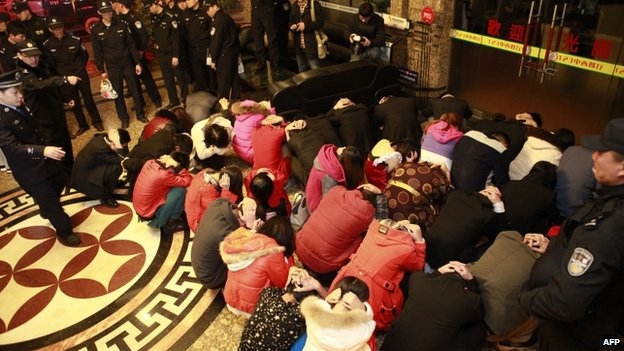Sex trade crackdown in Dongguan

GUANGZHOU: A tough crackdown on the illegal but highly lucrative sex trade in China’s “capital of sex” has once again thrown a spotlight on this controversial issue.
More than 6,700 police officers swooped on saunas, hotels, massage parlors and karaoke bars suspected of harboring prostitutes in the southern Chinese city of Dongguan, a manufacturing center and a booming entertainment hub infamous for its rampant sex industry on Feb.9, 2014.
It came hours after a China Central Television (CCTV) program revealed that a dozen hotels in Dongguan were offering sex services. Video clips showed that the daring sex trade even included a parade of prostitutes wearing revealing clothes to demonstrate their bodies in front of prospective clients.
A total of 12 entertainment venues involved in prostitution and other sexual services had been closed and 67 people had been placed under investigation, according to the Dongguan municipal public security bureau.
The latest crackdown immediately prompted diverse reactions ranging from sympathies for the sex workers to support for the police in a country where prostitution has been outlawed over the past six decades.
This is not the first time that Dongguan, a city with a population of over 8 million known for its lavish casinos and bath houses, as well as its back-street brothels, has been the subject of a police campaign designed to smash the sex trade.
Crackdowns like this have been seen at least three times in Dongguan over the past decade, said Dr. Ding Yu, a lecturer with the sociology department at Sun Yat-sen University. Ding has been studying the development of China’s sex industry and the lives of those it employs.
Many question whether entrenched sex businesses in the city can ever truly be stamped out thanks to a local “protective umbrella.”
“It is sometimes hard to decide whether pornographic activities are violating the law, so the police always have a major say in sex trade crackdowns,” Ding said, but stopped short of saying Dongguan police have been protecting sex businesses.
Footage shot by CCTV reporters with a hidden camera showed that hotel managers did not seem in the least bit worried about being found offering sex services. They told the reporter that no police officer would come. “Otherwise, we would have been out of business a long time ago,” one manager said.
Although no evidence has been provided, it is widely speculated by the public that local police offer protection for Dongguan’s rampant prostitution, a dynamic which could stimulate local consumption and bring job opportunities.
Media reports put the number of people working in the sex industry in Dongguan at 300,000 at least, although Xinhua has been unable to verify that number.
In the video clips, a CCTV reporter called police twice to blow the whistle on prostitution in two hotels, but no police showed up.
Officials in Dongguan have denied that the city’s prosperity is a result of its underground sex industry. In 2011, Lu Weiqi, vice head of the Dongguan municipal security bureau, told media that “the thriving hotel business in the city does not necessarily imply a prospering sex industry.”
As of Monday afternoon, eight police officers including the director of the police station which failed to immediately respond to the CCTV informants’ reports of illegal activities, have been suspended, the city’s municipal public security bureau said in a statement.
It also suggested the local industrial and commercial bureau revoke the licenses of the 12 entertainment venues exposed to be involved in selling sex.
The public security department of Guangdong Province, home to Dongguan, has promised a sweeping crackdown on pornography and gambling sites across the province.
Local police who provide protection to the sex industry will be severely punished, according to the Guangdong provincial government.
Prostitution has been outlawed in China since the Communist Party of China took power in 1949.
But a few Chinese activists and scholars believe that the world’s oldest profession should be legalized in the country, arguing that it would increase government tax revenue and better protect the vulnerable and currently “invisible” prostitutes from sexually transmitted diseases and violence.
While the topic remains by and large taboo out of morality concerns, the latest crackdown in Dongguan has prompted sharply divided opinions among the Chinese.
Some supported the campaign, saying it would make China more beautiful and civilized. But sympathies for Dongguan’s sex workers also poured in on the country’s Twitter-style microblogging service Sina Weibo, where “Dongguan sex trade crackdown” is among the most re-tweeted topics as of Monday afternoon.
“It is not those who sell their bodies that should be condemned,” said a user with the screen name “Sophie203.” “It is the parasites who make money by supporting the illegal business.”
Netizen “Chongshangwuqing” said he believed that the campaign will result in a more miserable life for sex workers, and predicted a slump in the city’s economy.
A large number of Weibo users are also criticizing CCTV for airing the program without blurring the sex workers’ faces, accusing it of violating the prostitutes’ rights.
“Some netizens equate freedom of sex to freedom of the sex market,” said Professor Lyu Xinyu with the Department of Journalism at Fudan University. “That’s why so many of them are sympathizing with the sex workers in Dongguan and supporting the legalization of prostitution.””But as long as there is a sex trade, prostitutes are always the victims,” he added. – Xinhua Feb.10 , 2014















